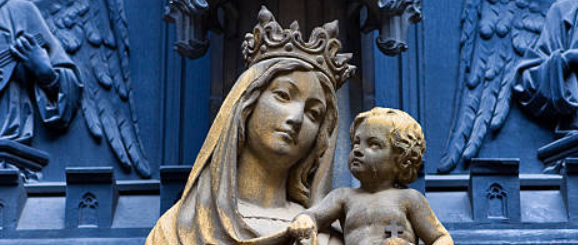Most likely we have seen many lovely images of the Madonna and Child in recent weeks, and should have the nativity before our eyes for the weeks to come. Despite her recent hardships and a horizon darkened by impending challenges, the Blessed Mother is always depicted as looking upon her beloved Child with a face suffused with peace. Since we cannot attribute to her the foresight of knowing that one day her Immaculate Heart would reign (she was too humble to look at herself), her benign confidence must have been attributable to something else.
Immersed in the holy scriptures, Our Lady would have been familiar with the overarching reality of man’s woeful predicament and the reliable promise of our Creator. She knew that God “hath looked down from his sanctuary; out of the heaven did the Lord behold the earth; that he might hear the mournings of such as are in captivity, and deliver them that are appointed unto death” (Ps 102: 19-20). This promise, first revealed after our first parents were expelled from the Garden—from God’s presence—is repeated innumerable times, and so whatever trials she was called to undergo in God’s inscrutable plan, Mary had every reason to believe that in the fullness of time, the captivity of mankind would be taken captive (cf. Ps 68:18, Eph. 4:8).
She was entirely familiar with the long history of the Jewish people, which oscillated between fidelity to God’s law and falling away from faith, which inevitably led to destruction and fragmentation. After each scourging, God gave his Chosen People another opportunity: “Then the Lord will turn thy captivity, and have compassion upon thee, and will return and gather thee from all the nations, wither the Lord thy God hath scattered thee (Deut 30:3).
This saga, amply illustrated on the political level, is more importantly lived out in the life of every man and woman, as each person is invited to live a life of faith and integrity; sadly, many fail, as we read in Proverbs “the evil deeds of the wicked ensnare them; the cords of their sins hold them fast (Pr 5:22). So when Our Lady pondered the psalmist’s question: “Who shall give salvation unto Israel out of Sion?” she knew the ready answer: “When the Lord turnest the captivity of his people, then shall Jacob rejoice, and Israel shall be glad” (Ps 14:11), and given her unclouded intellect she would have ascertained that the liberation at hand was a gift on more than one level.
Acknowledging that sin is not only an affront to God and the corruption of our souls but also a form of captivity, we must approach God as the one who will free us from the degradation to which we have fallen. Having given in to various temptations and indulgences, we now struggle to exhibit mastery over our lives, because the glitter of sin masks the dull rust of shackles, and frivolous pastimes eventually devolve into addictions, vicious habits, and toxic behaviors. Those who sauntered into forbidden realms just to prove their freedom from petty moral constraints found themselves lost in a dark labyrinth that shattered their integrity, robbed them of joy, and reduced them to a life embarrassing appetites.
The freedom that Christ offers to each of us came with a price, as the once tender limbs took on the bruises of our fetters, and the innocent flesh was given over to the lash. So rather than giving in to frothy distractions and seasonal tropes, take the time this Christmastide to kneel at the Crib. The Christ Child, who came expressly to free the captive, wants you to hand over to him your depraved desires and beg him for the key to unlock the chains. He will point you to the confessional, wherein the divine key is bathed in his Blood and entrusted to the hand of his beloved priest. As Saint Paul would proclaim: “the law of the Spirit of life in Christ Jesus has set me free from the law of sin and death” (Romans 8:2)—and that freedom awaits all who will but kneel and receive the gift.
This is the source of Mary’s own joy, this is why she smiles at her Little One. The hardships are part of the plan, her share in the gift, and her only grief would be that you remained a captive when liberation was yours for the asking.

Recent Comments